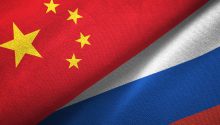by Pepe Escobar, Strategic Culture:

A new book by scholar Glenn Diesen, The Ukraine War & The Eurasian World Order, out in mid-February, asks the make-or-break question of the young 21st century: will the Hegemon accept a new geopolitical reality, or will it go Captain Ahab on Moby Dick and drag us all to the depths of a – nuclear – abyss?
An extra touch of poetic beauty is that the analysis is conducted by a Scandinavian. Diesen is a professor at the University of Southeast Norway (USN) and an associate editor at the Russia in Global Affairs journal. He had a stint at the Higher School of Economics in Moscow, working closely with the inimitable Sergey Karaganov.
TRUTH LIVES on at https://sgtreport.tv/
It goes without saying that European MSM won’t touch him; rabid yells – “Putinista!” – prevail, including in Norway, where he’s been a prime target of cancel culture.
That’s irrelevant, anyway. What matters is that Diesen, an affable, unfailingly polite man and an ultra-sharp scholar, is aligned with the rarified cream of the crop who is asking the questions that really matter; among them, whether we are heading towards a Eurasian-Westphalian world order.
Apart from a meticulous deconstruction of the proxy war in Ukraine that devastatingly debunks, with proven facts, the official NATOstan narrative, Diesen offers a concise, easily accessible mini-history of how we got here.
He starts to make the case harking back to the Silk Roads: “The Silk Road was an early model of globalization, although it did not result in a common world order as the civilizations of the world were primarily connected to nomadic intermediaries.”
The demise of the Heartland-based Silk Road, actually roads, was caused by the rise of the thalassocratic European powers reconnecting the world in a different way. Yet the hegemony of the collective West could only be fully achieved by applying Divide and Rule across Eurasia.
We did not in fact had “five centuries of western dominance”, according to Diesen: it was more like three, or even two (see, for instance, the work of Andre Gunder Frank). In a historical Long View that barely registers.
What is indeed The Big Picture now is that “the unique world order” produced by controlling “the vast Eurasian continent from the maritime periphery is coming to an end”.
Mackinder is hit by a train
Diesen hits the nail on the head when it comes to the Russia-China strategic partnership – on which the overwhelmingly majority of European intellectuals is clueless (a crucial exception is French historian, demographer and anthropologist Emmanuel Todd, whose latest book I analyzed here.)
With a lovely on the road formulation, Diesen shows how “Russia can be considered the successor of the Mongolian nomads as the last custodian of the Eurasian land corridor”, while China revives the Ancient Silk Roads “with economic connectivity”. In consequence, “a powerful Eurasian gravitational pull is thus reorganizing the supercontinent and the wider world.”
Poviding context, Diesen needs to engage in an obligatory detour to the basics of the Great Game between the Russian and British empires. What stands out is how Moscow already was pivoting to Asia all the way to the late 19th century, when Russian Finance Minister Sergei Witte started to develop a groundbreaking road map for a Eurasia political economy, “borrowing from Alexander Hamilton and Friedrich List.”
Witte “wanted to end Russia’s role as an exporter of natural resources to Europe as it resembled ‘the relations of colonial countries with their metropolises’”.
And that implies going back to Dostoyevsky, who argued that “Russians are as much Asiatics as European. The mistake of our policy for the past two centuries has been to make the people of Europe believe that we are true Europeans (…) It will be better for us to seek alliances with the Asiatics.” Dostoyevsky meets Putin-Xi.
Diesen also needs to go through the obligatory references to Mackinder’s “heartland” obsession – which is the basis of all Anglo-American geopolitics for the past hundred and twenty years.
Mackinder was spooked by railway development – especially the Trans-Siberian by the Russians – as it enabled Moscow to “emulate the nomadic skills of the Scythians, Huns and Mongols” that were essential to control most of Eurasia.
Mackinder was particularly focused on railways acting “chiefly as feeders to ocean-going commerce”. Ergo, being a thalassocratic power was not enough: “The heartland is the region to which under modern conditions, sea power can be refused access.”
And that’s what leads to the Rosetta Stone of Anglo-American geopolitics: to “prevent the emergence of a hegemon or a group of states capable of dominating Europe and Eurasia that could threaten the dominant maritime power.”
That explains everything from WWI and WWII to the permanent NATO obsession in preventing a solid rapprochement between Germany and Russia, by any means necessary.
Read More @ Strategic-Culture.org



